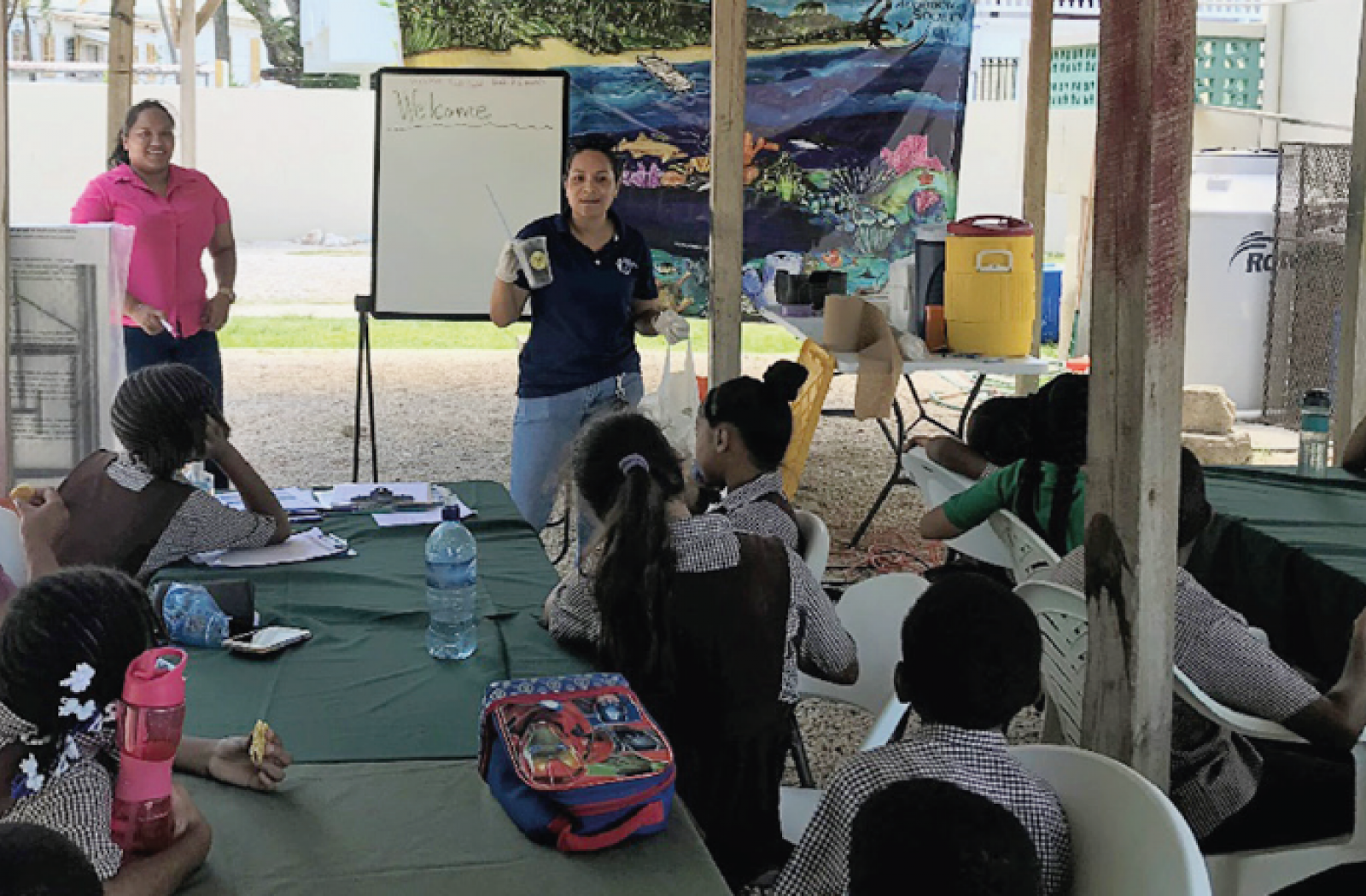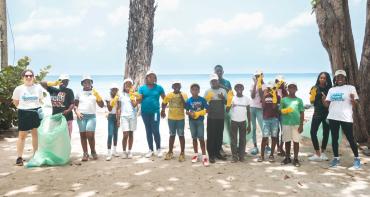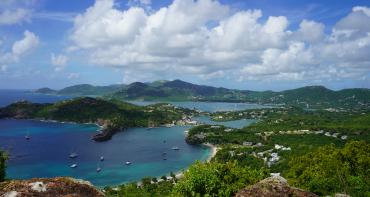The Commonwealth Blue Charter is highlighting case studies from the Commonwealth and beyond, as part of a series to spotlight best practice successes and experiences.

Share your own case study with us
“The development of the Marine Litter Action Plan with the assistance from CLiP shows Belize’s continued commitment in the protection of our marine environment and work to reduce
marine litter.”Maxine Monsanto, Environmental Officer, DOE, Belize (October 2019)
“It’s my hope our work under CLiP with Belize will help the country to continue to significantly reduce marine litter and support its world leading efforts to protect its globally precious environment.”
Peter Kohler, Country Lead for Belize, Cefas, on behalf of CLiP (October 2019)
Summary
Belize adopted its national Marine Litter Action Plan in 2019 following extensive stakeholder engagement and a public awareness campaign, which is still underway. The Belizean Department of the Environment developed this in collaboration with the Centre for Environment, Fisheries and Aquaculture Science, through the Commonwealth Litter Programme (CLiP). CLiP worked with Belize to support science and evidence development and awareness-raising on the issue of marine litter, and included several components, all of which supported the development of the action plan, which will guide Belize’s work towards addressing the issue of marine plastic pollution over the coming years.
The issue
Plastics enter the marine environment from a variety of land- and sea-based sources, including (but not limited to) accidental or deliberate littering, poor wastewater and solid waste management, and deliberate illegal dumping.
Marine plastics disproportionately affect smaller coastal nations like Belize, where the economy is heavily reliant on tourism and there is an active fishing sector, and where often waste management infrastructure is limited.
In Belize, the Department of the Environment (DOE) began looking into the country’s use of single-use plastic items in 2017, prompted by the prevalence of discarded Styrofoam food containers found on the streets. The DOE convened an ad hoc working group to understand the issue further and undertook a snapshot analysis of the rate of import, manufacturing and disposal of single-use items in Belize. The results indicated that Belize imported over 200 million single-use plastic bags and 52 million Styrofoam and plastic food containers annually, and locally produced and manufactured an estimated 35 million single-use plastic bags and 5 million pieces of Styrofoam. As a result, the ad hoc group was formalised, and began working on a plan to reduce the amount of waste coming from this type of plastic in Belize.
The response
Although Belize had information on the volumes of single use items being manufactured and imported, it did not have data on the quantities being found in the environment (either terrestrial or marine). Therefore, when the Belize Commonwealth Litter Programme (CLiP) project was proposed, it was at an ideal time for the country to build on the work already started, and to begin the establishment of a national marine litter monitoring programme. CLiP included several components to support Belize in its efforts to tackle the issue of marine litter. These included:
- Review of existing best practices for Marine Litter Action in Belize and how these could be scaled for the national action plan;
- An initial baseline study of quantities and types of litter and microplastics in the marine environment, which was used (alongside importation, production and manufacturing data) to engage with stakeholders;
- Additional studies on waste generation and management, port reception facility capabilities and desktop studies assessing single-use plastic alternatives;
- Capacity-building activities, supporting the set-up of a microplastics testing lab and providing microplastics and macro plastics testing and monitoring training to government scientists and University of Belize staff and students; and
- Education and outreach activities, including an awareness-raising campaign aimed at the general public, an art competition and an innovation competition, as well as a number of workshops and beach clean-up events held with local non-governmental organisations (NGOs), businesses, government agencies, academia, representatives of the tourism sector, fishing cooperatives, private sector, church groups and rural communities. At these events, the findings of the initial studies were presented, and the environmental impacts of marine litter were discussed, alongside current best practices and ideas for reducing quantities of marine plastic pollution.

Belize Scouts Association and Cefas on outreach. Source: Crown Copyright 2019
Partnerships and support
The Government of Belize, specifically the DOE, worked closely with the Centre for Environment, Fisheries and Aquaculture Science (Cefas) through CLiP, which is funded by the UK Department for Environment, Food and Rural Affairs (Defra). The Belize Marine Litter Action Plan was developed in approximately four months, a period that included all stakeholder engagement activities. However, it should be noted that Belize already had in place an established working group and stakeholder group working on how the country could tackle the issue of single-use plastics in the environment. The established working group included six different government departments, including representatives from the DOE, the Solid Waste Management Authority, the Ministry of Trade, the Ministry of Tourism and Aviation, the Directorate General for Foreign Trade, Beltraide and Belize Customs and Excise. Sub-committees involving academia, NGOs, private sector businesses and civil society were in place to help address and reduce pollution from single-use plastics. In addition, development of the Marine Litter Action Plan also involved consultation of stakeholders across multiple sectors including government, businesses, schools, and fishing communities.
Results, accomplishments and outcomes
The collaboration between Cefas and the Belizean government under CLiP has produced many clear and connected results. The main achievement is the adoption of the Belize Marine Litter Action Plan, which will guide Belize’s efforts to reduce marine plastic pollution over the coming years. The action plan was developed through extensive stakeholder engagement and supported by a series of policy papers. Stakeholder workshops identified gaps and actions related to policy, stakeholder coordination, waste management and auditing, outreach and scientific knowledge. A total of 25 marine litter actions were identified in consultation with the government and other key stakeholders. These actions provide a framework for all sectors to coordinate and tackle marine litter in Belize over the coming years. The Belizean Cabinet formally adopted the Marine Litter Action Plan on 27 August 2019. Belize aspires to take a leading role in supporting other Caribbean nations in tackling marine litter.
In addition to adopting the Marine Litter Action Plan, Belize has prohibited and restricted certain single-use plastics items (including plastic shopping bags, drinking straws, Styrofoam, plastic food utensils, clamshells, flat plates and cups). The adoption of this ban was supported by the evidence and stakeholder engagement activities undertaken within the CLiP project.
See the action plan.
Although progress on implementing the action plan has stalled temporarily owing to the global COVID-19 pandemic, the public awareness campaign has continued. Once the situation begins to normalise, Belize will focus on implementing some of the key actions in the plan, including (but not limited to) the development and implementation of a national plan to address waste from vessels at national level and incorporate pollution from ships under marine pollution prevention legislation.
Challenges
The main challenges facing Belize when developing the Marine Litter Action Plan were:
- Lack of technical expertise (both governmental and in the private sector), for example knowledge on which alternatives to single-use plastics would be most appropriate for use in Belize;
- Lack of equipment, for example to undertake the microplastic analysis; and
- Lack of funding, for example for awareness-raising campaigns and stakeholder events.
In terms of the CLiP project, the challenges related mainly the time constraints, with just four months to work together to collect an initial baseline, analyse the results, present them to stakeholders and develop targeted actions. The initial work already undertaken by the Belizean government in advance of the CLiP project contributed greatly in terms of speeding up this process. The already present government commitment and established working group provided a good foundation for the Cefas project team to build on. The stakeholder network was already being established and this aided with activities within the short timeframe available.

Marine Litter Monitoring Training on Belizean beach. Source: Crown Copyright 2019
Key lessons learnt
The key lesson learnt during the development of the national action plan was that, as a first step, any country wishing to develop such a plan should undertake stakeholder analysis to understand the different players involved. Through early engagement with stakeholders, any existing work already underway can be identified and built on. Second, a scientific evidence base should be compiled to present to the relevant stakeholders the need to develop the plan. Finally, a clear outline of the different steps to follow to develop the action plan and a timeline for completion should be shared with all stakeholders. These three steps are essential if the action plan is to have buy-in from the different stakeholders and members of the public. Another important lesson is to ensure that national work complements any regional plans already in place.
The UK-funded CLiP project in Belize has highlighted the necessity of having good collaboration with the country in question, but more specifically the importance of mapping stakeholders across sectors and working with them to identify how to add-value to ongoing work. This will enable smoother running of workshops, events and general logistical challenges but also help avoid any potential cultural misunderstandings.
Acknowledgments
UK-Defra funds the Commonwealth Marine Litter Programme (CLiP), which is led by the UK through the Centre for Environment Fisheries and Aquaculture Science (Cefas). The programme supports a number of countries across the Commonwealth to tackle plastics entering the oceans. CLiP contributes to delivering the objectives under the UK and Vanuatu-led Commonwealth Clean Oceans Alliance (CCOA), which calls on other countries to pledge action on plastics. CCOA also promotes actions in line with the United Nations Sustainable Development Goal 14 (life below water) to conserve and sustainably use the oceans, as well as contributing to the UK Government’s 25 Year Environment Plan.
This work has been graciously supported by the Department of the Environment, Belize and the British High Commission in Belize.
Lead contacts
DOE, Belize | E-mail
Peter Kohler, CLiP Country Lead, Cefas | E-mail
Download this case study (PDF)
View all Case Studies
Media contact
- Josephine Latu-Sanft Senior Communications Officer, Communications Division, Commonwealth Secretariat
- +44 20 7747 6476 | E-mail



